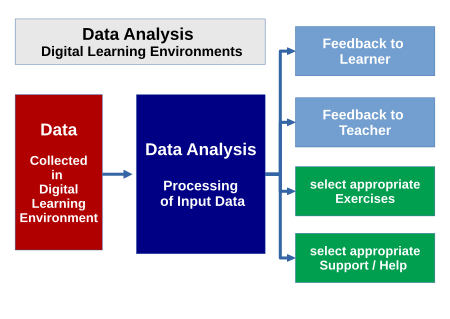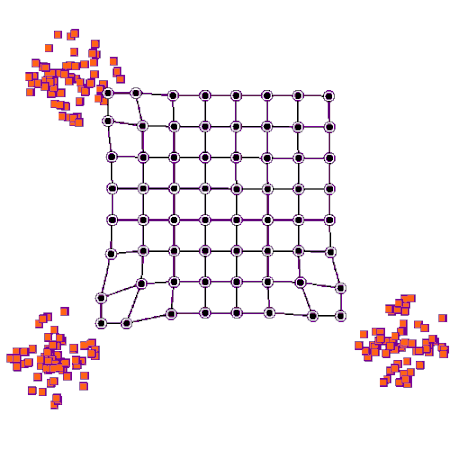Data analysis/Introduction
Introduction
[edit | edit source]This page can be displayed as Wiki2Reveal slides. Single sections are regarded as slides and modifications on the slides will immediately affect the content of the slides.
Objective
[edit | edit source]This learning resource in Wikiversity has the objective to introduce into data analysis and support the learner in finding their route from data to information in order to support decision making in their area of interest.
Target Group
[edit | edit source]The target groups for this learning resource is mixed groups of scientists and students, coming from different domains, e.g.:
that are planning to perform a data collection and data collection in their domain.
Educational Sciences
[edit | edit source]- (Master Thesis) Students that are preparing e.g. master thesis in which they analyze data with a methodology and want to identify patterns in the data, extract relevant information according to the given hypothesis, ...
- (PhD - Staff Members Research Project) PhD students or staff members that are planning to setup a learning and research environment with an integrated data analysis workflow.
Design of Digital Learning Environments
[edit | edit source]- (Learning Analytics) Educational scientist that want to modify digital learning environments[1] in way that learner progress can be monitored and appropriate exercises and feedback can be given to each student.
- (Data 2 Learner's Profile) Identify the appropriate data analysis workflow that can be integrated in the digital learning environment to create instant feedback and adaptation of learning environment according to learner's profile
Diagram - Workflow
[edit | edit source]Environmental Sciences
[edit | edit source]Environmental scientist that have monitoring data e.g. from an habitat with a constant input stream of data (salinity, temperature, ...) and want to setup a data analysis workflow that supports their scientific work in progress and finally support decision makers e.g. to manage a habitat in a sustainable manner (see Sustainable Development Goals)
Generic Elements of Data Analysis
[edit | edit source]The mixed group of people coming from different domains requires in the learning environment
- a specific data analysis support for area of interest, the environmental scientist to find his/her appropriate methodology to analyze the data and
- to compare e.g. data analysis in educational sciences with data analysis in environmental sciences and identify the generic elements and if possible share, exchange and collaborate on specific data analysis workflows and implementation (e.g. in KnitR)
Data Analysis - Linear Regression
[edit | edit source]Consider the following figure about Linear Regression
Data Analysis - Basic Example
[edit | edit source]We look an Linear Regression
- red dots represent the collected data,
- blue line represents the information derived from the data,
- the green lines define the deviation from the generated information of the data analysis
Data Analysis - Ongoing Data Input
[edit | edit source]Data Analysis - Basic Example
[edit | edit source]- red dots represent the collected data,
- mesh grid changes represents the generated information of the data analysis
- mesh grid changes in time with a constant input stream of data,
- noise in the data / cluster
Learning Tasks / Activities
[edit | edit source]- Explain the application of a constant input stream of data in the context of a learning environment and compare the approach of data analysis and adaptation to the requirements and constraints of the learner.
- Apply the constant input stream of monitoring data in the context of environmental sciences.
References
[edit | edit source]- ↑ 1.0 1.1 Leitner, P., Khalil, M., & Ebner, M. (2017). Learning analytics in higher education—a literature review. Learning analytics: Fundaments, applications, and trends, 1-23.
- ↑ Burden, F. R., & Guenther, A. (2002). Environmental monitoring handbook. I. Mckelvie, & U. Förstner (Eds.). New York: McGraw-Hill.
- ↑ Rushton, G. (2003). Public health, GIS, and spatial analytic tools. Annual review of public health, 24(1), 43-56
See also
[edit | edit source]Page Information
[edit | edit source]You can display this page as Wiki2Reveal slides
Wiki2Reveal
[edit | edit source]The Wiki2Reveal slides were created for the Data analysis' and the Link for the Wiki2Reveal Slides was created with the link generator.
- This page is designed as a PanDocElectron-SLIDE document type.
- Source: Wikiversity https://en.wikiversity.org/wiki/Data%20analysis/Introduction
- see Wiki2Reveal for the functionality of Wiki2Reveal.



